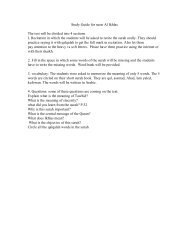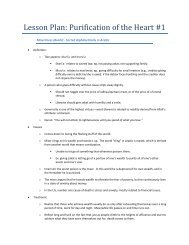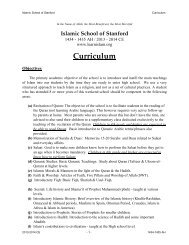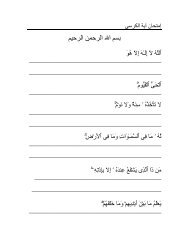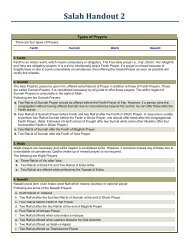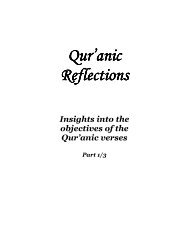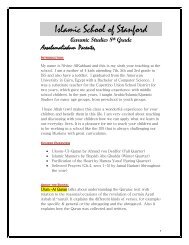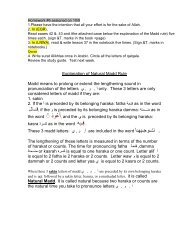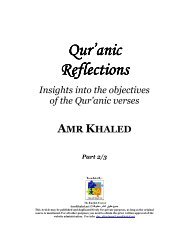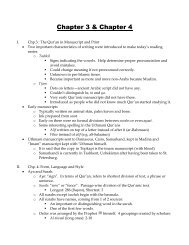voice. Verily, the harshest of all voices is the braying of the Asses” (TMQ, 18-19:31). Itis vital to deal with people politely and courteously down to the smallest details, such as inwalking and talking. A person should neither raise his cheek in arrogance, nor demeanhimself, but he should strike a middle path in walking (walking in a humble and modestway). Allah (SWT) says what can be translated as, “And be moderate (or show noinsolence) in your walking” (TMQ, 19:31). He should not raise his voice more than isnecessary for one to be heard.Defining a goal in life and planning for the futureOne of the wonders of this Surah is that it also covers this theme in child rearing. This isevident from Allah’s saying which can be translated as, “And be moderate (or show noinsolence) in your walking” (TMQ, 19:31). This ayah completes the series of manners andgood behaviors that Allah (SWT) discusses in the Surah, as it means one should walk aroundwith dignity, without arrogance or haughtiness. “And be moderate (or show no insolence)in your walking” may also mean that you must have a purpose and goal with each step, sothat you don’t live a life with no purpose [another meaning for the Arabic word aqsid ispurpose, so the ayah could read as, “And have purpose in your walking”].Have a compassionate manner for child rearingNotice how many instructions are covered in tremendous parental love and feeling. When Iread these ayahs it is as if I feel Luqman, the gentle man, instructing his son gently andtelling him before each teaching, “My son, my son.” The Surah tells parents to befriend theirchildren and win them over before instructing them. Brother Muslim, talk to them aboutyour experiences and mistakes in life. Use friendship to advise them before using strongerDo’s and Don’ts. This makes the Surah truly remarkable as a practical guide in so far as theduty of child rearing is concerned.Allah’s knowledge and powerSince monotheism is the primary focus of child rearing, we see that the Surah focuses onmonotheism to which we should draw our children’s attention while teaching them. Lookingat the beginning of ayah eleven, we see that it concentrates on this theme, especially whenAllah (SWT) says what can be translated as, “He has created the heavens without anypillars that you see, and has set on the earth firm mountains lest it should shake withyou . . .” (TMQ, 10:31). This vision presents to fathers an important method to sowmonotheism in the hearts of children. Allah (SWT) says what can be translated as, “This isthe creation of Allah. So show Me that which those (whom you worship) besides Himhave created . . .” (TMQ, 11:31). Many other ayahs carry the same message when Allah(SWT) says what can be translated as, “See you not (O men) that Allah has subjected foryou whatsoever is in the heavens and whatsoever is in the earth, and has completed andperfected His Graces upon you, (both) apparent (i.e. Islâmic Monotheism, and thelawful pleasures of this world, including health, good looks, etc.) and hidden [i.e. One’sFaith in Allah (of Islâmic Monotheism) . . .” (TMQ, 20:31). Until we get to a remarkableexample of Allah’s (SWT) Knowledge Allah (SWT) says what can be translated as, “And ifall the trees on the earth were pens and the sea (were ink wherewith to write), withseven seas behind it to add to its (supply), yet the Words of Allah would not beexhausted. Verily, Allah is All Mighty, All-Wise,” (TMQ, 27:31). This ayah is an
extraordinary example of using nature, to instruct them about Allah’s (SWT) Knowledge andHis span over all creation.Not blindly followingThe Surah concentrates on the dangers of raising children upon blindly following theirparents’ belief without understanding it. On one hand, it shows that love and kindness mustbe the major characteristics of child-parent relationship, so that the child is convinced withthe parents’ teachings. On the other hand, it is prohibited for children to follow their parents’religion [if it is not Islam]. Allah (SWT) says what can be translated as, “And when it is saidto them: “Follow that which Allah has sent down”, they say: “Nay, we shall follow thatwhich we found our fathers (following).” . . .” (TMQ, 21:31).The ayahs clearly show that both the father and the son are responsible for their actions in thelife of this world on the Day of Judgment. The father will not benefit his son at all as statedby Allah (SWT) when He says in what can be translated as, “O mankind! Be afraid of yourLord (by keeping your duty to Him and avoiding all evil), and fear a Day when nofather can avail aught for his son, nor a son avail aught for his father . . .” (TMQ,33:31). Thus, it is crucial to raise them up on proper iman (faith), correct a’akidah(principles) and good traits.Ending the Surah: Allah’s (SWT) knowledgeJust as the Surah starts with monotheism, its ending concentrates on Allah’s (SWT)Knowledge and Power, and the incapability of the created in knowing anything from HisUnseen. Allah (SWT) says what can be translated as, “Verily Allah, with Him (Alone) isthe knowledge of the Hour, He sends down the rain, and knows that which is in thewombs. No person knows what he will earn tomorrow, and no person knows in whatland he will die. Verily, Allah is All-Knower, All-Aware (of things)” (TMQ, 34:31).There are five hidden spheres of information no one but Allah (SWT) knows: the time of theDay of Judgment, the time of rainfall, the type of fetus before its creation, future events andwhere each person will die and be buried. O Muslims! Raise your children up to have faithand belief in Allah (SWT) and His monotheism in this way.And we gave Luqman wisdomOne of the nice things about this Surah is that it primarily focuses on wisdom, for the Surahstarts with Allah’s (SWT) words that can be translated as, “Alif-Lâm-Mîm. [These lettersare one of the miracles of the Qur’an, and none but Allah (Alone) knows theirmeanings]. These are Verses of the Wise Book (the Qur’an).” (TMQ, 1-2:31).Even when the Surah debases those who block the way to Allah (SWT), He says what can betranslated as, “And of mankind is he who purchases idle talks (i.e. music, singing, etc.) tomislead (men) from the Path of Allah without knowledge” (TMQ, 6:31). Consequently,mindless chatter is the opposite of wisdom. Not only that, in the first ayah Luqman ismentioned when Allah (SWT) says what can be translated as, “And indeed We bestowedupon Luqman Al-Hikmah (wisdom and religious understanding) saying: “Give thanksto Allah.”“ (TMQ, 12:31). It is as if Luqman’s advice to his son is the cream of his wisdomand experience in life and he is passing it on to those who follow.
- Page 8 and 9: (TMQ, 48:30). Even in the creation
- Page 14: Finally, I would like to ask you th
- Page 17 and 18: Surat Al-Ahzab (The Allied Parties)
- Page 19 and 20: Messenger, and the home of the Here
- Page 21 and 22: Do you see how the surrender to All
- Page 23 and 24: A universal methodAfter presenting
- Page 25 and 26: know who will accept and follow gui
- Page 27 and 28: translated as, “he said, “O my
- Page 29 and 30: Thus he repented and turned back to
- Page 31 and 32: There is an Ayah in Surat “Al-Nah
- Page 33 and 34: it, and its gates will be opened, a
- Page 35 and 36: When Firaawn threatened to kill Mus
- Page 37 and 38: A person who performs Da’wa shoul
- Page 39 and 40: Surat Fussilat (Expounded), Surat A
- Page 41 and 42: ancient Egypt), which represented o
- Page 43 and 44: The aim of these Surahs is to make
- Page 45 and 46: translated as, “And they become d
- Page 47 and 48: “When Jesus came with clear signs
- Page 49 and 50: translated as, “They said, “Hav
- Page 51 and 52: Surat Muhammad, Surat Al-Fath (Conq
- Page 53 and 54: clear srah is sent down, and therei
- Page 55 and 56: The Truth: “Indeed you will defin
- Page 57 and 58: As we have mentioned, this Surah is
- Page 59 and 60: It is noticed that good conduct has
- Page 61 and 62:
these Ayahs? They are for us to asc
- Page 63 and 64:
Allah says what can be translated a
- Page 65 and 66:
The wonder of Qur’an is crystal c
- Page 67 and 68:
The ending of Surat An-Najm “So p
- Page 69 and 70:
learning the Qur’an by heart, att
- Page 71 and 72:
cause it to grow, or are We the Cau
- Page 73 and 74:
“Then, in their wake, We followed
- Page 75 and 76:
Would you choose excessive material
- Page 77 and 78:
Women’s role in “Belonging”:A
- Page 80 and 81:
what you do” (TMQ, 58:3) - “…
- Page 82 and 83:
sacrifice dearly for the sake of th
- Page 84 and 85:
to you as emigrants, examine them;
- Page 86 and 87:
said: "We are Allâh’s helpers" (
- Page 88 and 89:
Their leader, Abdullah Ibn-Ubai Ibn
- Page 90 and 91:
Surat At-Tahreem (Divorce)= The Rol
- Page 92 and 93:
Surat Al-Qalam (The Pen), or Nun= M
- Page 94 and 95:
The Surah starts with the divine du
- Page 96 and 97:
Why can’t you be like them? Why d
- Page 98 and 99:
In Surat Al-Muddathir, on the other
- Page 100 and 101:
Surahs of the Thirtieth PartConclus
- Page 102 and 103:
man in the best form and shape. It
- Page 104:
− The importance of team-work,



